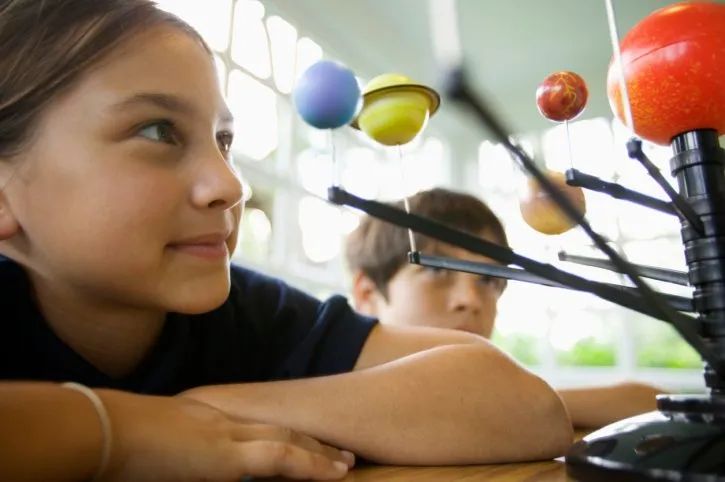What on Earth is a Cosmic Education?
If you are looking into Montessori education for your 6- to 12-year-old child (Montessori referred to this age as the “second plane of development”), you will likely hear the term “Cosmic Education.” So, what on Earth does this far-out phrase really mean?

As with her educational method for younger children, Dr. Montessori developed the second plane curriculum by observing children and identifying exactly what their specific developmental needs are at this age. Montessori’s observations led to the development of what she called Cosmic Education.
Start with the Big Picture
Cosmic Education starts with the whole, (i.e. the universe), and works toward the parts, (i.e. individual cultures, history, geography, life forms, etc.). This gives the child a foundational sense of perspective. Within the big picture of the universe, everything the child learns is connected. Children can use this big picture perspective to mentally organize new information. When understood as connected parts of a whole, the information gains relevance, which is an essential part of capturing a child’s interest.
It should be realized that genuine interest cannot be forced. Therefore, all methods of education based on centers of interest chosen by the adult are wrong. Moreover, these centers of interest are superfluous, for the child is interested in everything. A global vision of cosmic events fascinates children and their interest will soon remain fixed on one particular part as a starting point for more intensive studies. Thus, the way leads from the whole, via the parts, back to the whole. The children will develop a kind of philosophy that teaches them the unity of the universe. This is the very thing to organize their intelligence and to give them a better insight into their own place and task in the world, at the same time presenting a chance for the development of their creative energy. ~ Dr. Maria Montessori
During the second plane of development, children experience an innate need to use: a) their imagination to envision concepts that they cannot necessarily see, and b) their reasoning minds to make sense of how each new idea fits into the big picture.
The Imagination

The elementary school years are the most significant developmental years for the child’s imagination. The child, who previously had to experience concepts through his or her senses, can now imagine ideas without physically experiencing them. Compelled by his growing imagination, the elementary child will seek information that corresponds with his interests.
Human consciousness comes into the world as a flaming ball of imagination. Everything invented by man, physical or mental, is the fruit of someone’s imagination. In the study of history and geography, we are helpless without imagination, and when we propose to introduce the universe to the child, what but imagination can be of use to us? ~ Dr. Maria Montessori
The Reasoning Mind
According to Dr. Montessori, children transition from the Absorbent Mind stage into the Reasoning Mind stage at about age six or seven. Children no longer soak up information spontaneously and without conscious effort. (To learn more about the Absorbent Mind stage, read more here.)
Now learning takes place very differently. Children are less drawn to mimicry and repetition, and are more inclined toward abstract thinking in areas of science, history, geography and more, as they apply these to the world and the universe around them.

Children at this age are also developing important social skills. Thus, they are far more interested in engaging with others in their environment. These children are making the transition from working (and playing) alongside peers to working with them cooperatively. They become interested in their extended community and have an ever-broadening sense of social awareness.
To offer the child a “Cosmic Education” is to offer the child a choice, giving them a chance to pursue what interests them. Once you have captured that interest, the child’s own sense of curiosity and wonder is engaged. This is the beginning of a love for learning, which could stay with your child for life.
The secret of good teaching is to regard the child’s intelligence as a fertile field in which seeds may be sown, to grow under the heat of flaming imagination. Our aim therefore is not merely to make the child understand, and still less to force him to memorize, but so to touch his imagination as to enthuse him to his inmost core. ~ Dr. Maria Montessori
Interested in Elementary Montessori Teacher Certification?
Or call us 406 284-2160 today!




















